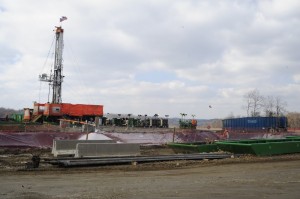
By Lynn Thorp, National Campaigns Director (Follow Lynn on Twitter - @LTCWA)
Update - February 18, 2014: Click here to tell EPA to Put Drinking Water First and Protect Communities from Coal Ash!
I’m pretty sure many people don’t make the connection between this week’s finalization of permitting guidelines for hydraulic fracturing activities using diesel and two big stories we’re following – the chemical spill in West Virginia and the coal ash spill in North Carolina. That’s understandable because we don’t approach protecting drinking water sources in a holistic way. In fact, it sometimes appears that we don’t approach drinking water protection at all!
But this is all about acting as if our drinking water really matters, and using the laws we have or creating new ones to make sure drinking water sources are protected.
The Environmental Protection Agency’s (EPA) publication of the Permitting Guidelines on Tuesday is important because without it, the Safe Drinking Water Act can’t be implemented when it comes to the only kind of hydraulic fracturing that isn’t exempt from the Act – those operations using diesel in the fluids injected into the ground. Even as they exempted hydraulic fracturing, or fracking, from the Act in 2005 Congress recognized that the chemicals in diesel fuel pose such demonstrated threats to underground sources of drinking water that they created this exception.
So drilling using diesel requires a permit under the Safe Drinking Water Act’s Underground Injection Control Program (UIC), but permitters have never issued permits for hydraulic fracturing and they need guidelines for how to write those permits. Thus this Guidance. We worked hard to make sure EPA got this done and we’re glad to see progress. But we’re not done. EPA needs to do a formal rulemaking to make sure that the UIC requirements, based on preventing endangerment to underground sources of drinking water, have the force of law in all states. We would like to see diesel use prohibited entirely. And, we would like to see Congress lift all the exemptions which the oil and gas industry enjoy from our health and environmental protection laws. But for today, we will say that consideration of drinking water has prevailed and policy progress has been made.
As for the connection to West Virginia and North Carolina? We like to say we ought to Put Drinking Water First, and we’re not going to stop. We have to put policies in place AND enforce them to truly protect our drinking water sources. The alternatives are clear today and they will continue to be so as long as we let polluters take shortcuts.
The referenced media source is missing and needs to be re-embedded.
Hydraulic fracturing operationsRelated Posts
Stay Informed
Get the latest updates and actions:
Thanks for signing up!
There was a problem processing your signup. Please try again.


